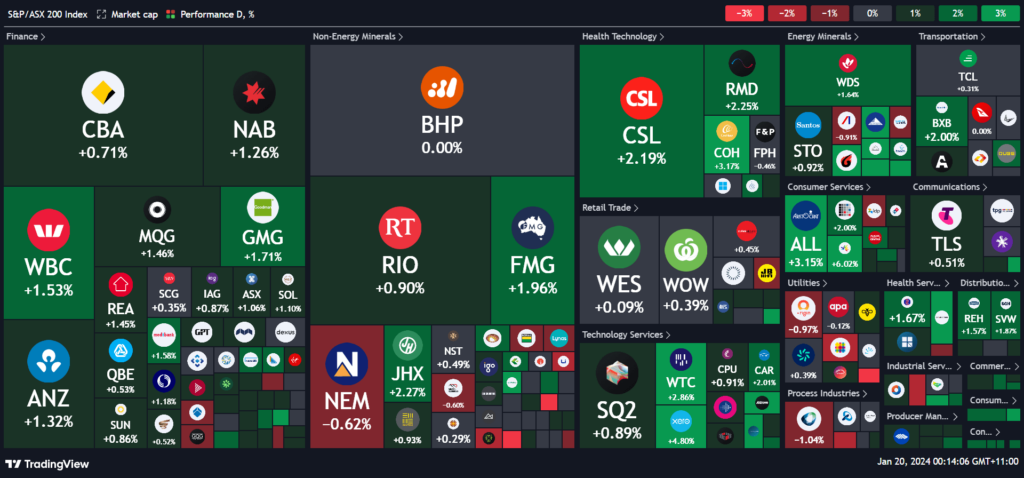What's Affecting Markets Today
A$ on Track with Third Weekly Decline
The Australian dollar saw a slight uptick on Friday, recovering from its lowest point in six weeks, yet it’s heading towards a third consecutive weekly decline. Since Monday, the $A has fallen by 1.5%, largely due to dropping commodity prices, China’s economic slowdown, and shifts in US interest rate expectations. The likelihood of a March rate cut by the US Federal Reserve has decreased from 70% to 56%, following statements by Fed officials. Australian bond futures indicate a possible cash rate reduction by the Reserve Bank in November, contrasting with expectations of more frequent cuts in the US.
Gold Drifts Higher as Middle East Tension Attracts Safe-Haven Inflows
Gold prices increased, driven by safe-haven demand amid escalating Middle East conflicts and uncertainty around the US Federal Reserve’s interest rate plans. Spot gold rose by 0.7% to $US2019.12 per ounce. This rise followed the US government’s reclassification of Yemen-based Houthi rebels as a terrorist group and recent attacks in the Red Sea. The likelihood of a March rate cut by the Federal Reserve is currently at 57%. Market analysts are assessing the potential impact of delayed rate cuts on gold prices, considering recent US economic data.
Deutsche Quits RBA Rate Lift Call
Deutsche Bank has withdrawn its prediction of an Australian cash rate hike, influenced by a significant slowdown in November’s consumer price indicator. They no longer anticipate a rate increase by the Reserve Bank of Australia in its February meeting and expect no further hikes in this cycle. National Australia Bank has also revised its forecast, agreeing that the cash rate has peaked at 3.35%. Deutsche Bank’s chief economist, Phil O’Donoghue, now expects two rate reductions in the latter half of the year, adjusting the cash rate to 3.85% by December.
ASX Stocks
ASX 200 - 7,421.2 (+1.02%)
Key Highlights:
Australian shares rebounded on Friday, ending a four-day losing streak, thanks to positive US labor data and a subsequent rally in Wall Street. The S&P/ASX 200 closed 1% higher at 7421.2, despite ending the week down by 1%. The All Ordinaries also gained 1%, reaching 7652.3.
The rally was led by the tech sector, which saw a 3% increase. Notable gainers included Zip, EML Payments, and Xero, with significant jumps in their stock prices. Resource stocks also gained traction after commodity prices rebounded on hopes of Chinese stimulus measures. Miners like Rio Tinto and Fortescue Metals saw an increase, while BHP Group remained flat.
Uranium miners like Boss Energy and Paladin Energy, however, experienced declines after their earlier weekly rallies.
Bank stocks also fared well, with ANZ, CBA, NAB, and Westpac all closing higher.
In corporate news, Whitehaven Coal was a top performer, maintaining its annual production guidance despite operational challenges. Yancoal and New Hope also saw substantial gains, reflecting an optimistic outlook for coal miners in 2024, especially with increasing demand from India and China.
Biotech company Mesoblast surged 13.2% following FDA approval for a treatment for a rare paediatric disease, highlighting the session’s broad market gains.

Leaders
MSB – Mesoblast Ltd (+13.21%)
TBN – Tamboran Resources (+11.67%)
ZIP – ZIP Co Ltd (+11.40%)
EML – EML Payments Ltd (+9.89%)
BLX – Beacon Lighting Group Ltd (+7.66%)
Laggards
LRS – Latin Resources Ltd (-9.09%)
INR – Ioneer Ltd (-8.00%)
OCA – Oceania Healthcare Ltd (-7.25%)
IPD – Impedimed Ltd (-6.90%)
AVR – Anteris Technologies Ltd (-6.35%)
